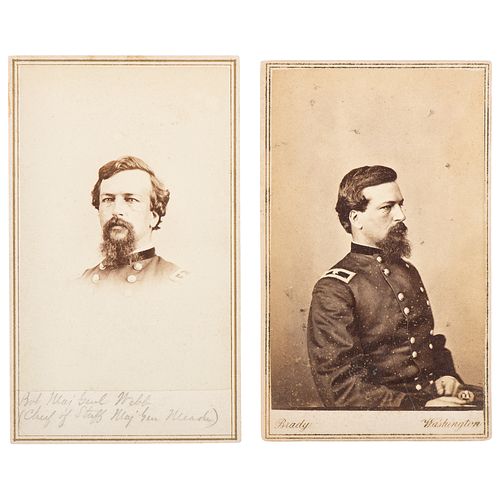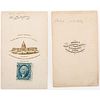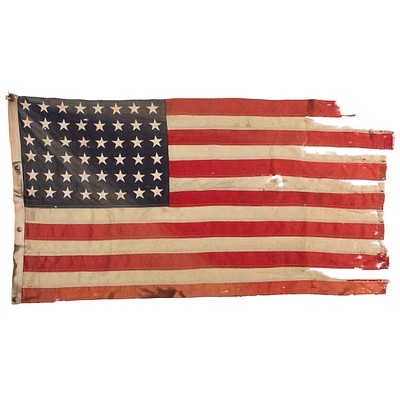Medal of Honor Recipient Brigadier General Alexander Webb, Pair of Fine CDV Portraits by Brady and Gardner
About Seller
6270 Este Ave.
Cincinnati , OH 45232
United States
With offices in Cincinnati, Cleveland and Denver, Cowan’s holds over 40 auctions each year, with annual sales exceeding $16M. We reach buyers around the globe, and take pride in our reputation for integrity, customer service and great results. A full-service house, Cowan’s Auctions specializes in Am...Read more
Two ways to bid:
- Leave a max absentee bid and the platform will bid on your behalf up to your maximum bid during the live auction.
- Bid live during the auction and your bids will be submitted real-time to the auctioneer.
Bid Increments
| Price | Bid Increment |
|---|---|
| $0 | $25 |
| $500 | $50 |
| $1,000 | $100 |
| $2,000 | $250 |
| $5,000 | $500 |
| $10,000 | $1,000 |
| $20,000 | $2,500 |
| $50,000 | $5,000 |
| $100,000 | $10,000 |
About Auction
Jun 26, 2020
Cowan's Auctions is delighted to present the June 26 American Historical Ephemera and Photography Auction, including 55 lots devoted to the African American experience, over 175 lots dating from the Civil War Era, and more than 60 lots documenting life in the American West. Cowan's Auctions dawnie@cowans.com
- Lot Description
Medal of Honor Recipient Brigadier General Alexander Webb, Pair of Fine CDV Portraits by Brady and Gardner
Lot of 2. Includes one seated portrait of Brigadier General Alexander Webb posed holding a kepi in his lap. Brady: Washington, DC; and one bust portrait of Webb. Gardner: Washington, DC. Two-cent revenue stamp on verso.
Alexander S. Webb (1835-1911) had an impressive military genealogy, including a grandfather who was wounded at Bunker Hill and served on George Washington's staff during the Revolutionary War, which likely led to his early preparation for military service. He attended Colonel Churchill's Military School in Ossining before gaining entry into the United States Military Academy at West Point, from which he graduated in 1855 and went on to serve in the 4th US Artillery as a breveted second lieutenant. He fought the Florida Seminoles in 1856, and a year later returned to West Point as a mathematics instructor until the Civil War got underway. Webb helped to defend Fort Pickens, was present at the Battle of First Bull Run, and served under General William F. Barry, first as his aide-de-camp and then as assistant inspector general during the Peninsula Campaign. He was lauded a hero for assembling a line of artillery defense during the Battle of Malvern Hill, causing Brigadier General Daniel Butterfield to conclude that he saved the Union Army from destruction.
Webb received a promotion to lieutenant colonel before the Battle of Antietam, during which he served as chief of staff in Major General Fitz John Porter's V Corps. He was given temporary command of the second brigade of John Gibbon's division of Winfield Hancock's II Corps during the Battle of Chancellorsville, and thereafter received a promotion to brigadier general from President Lincoln on July 1, 1863. At Gettysburg, Webb defended Cemetery Hill and maintained the Union position against Pickett's Charge, enduring a thigh and groin injury in the process. He was again wounded at Spotsylvania, this time severely, and did not return to service until January of 1865. He ended his service in the Union Army as chief of staff to General George Meade, and was breveted a major general the following year.
Webb was assigned to the 44th US Infantry as a lieutenant colonel in 1866 and was honorably discharged from service in 1870. He served as president of City College of the City of New York for 33 years, during which period he also wrote a book about his Civil War experience titled, The Peninsula: McClellan's Campaign of 1862. He was eventually awarded the Medal of Honor in 1891 for gallantry at Gettysburg, and received the posthumous honor of interment at West Point upon his death in 1911. Two statues of Webb stand to proclaim his legacy still today, one at Gettysburg Battlefield, and the other at the City College of New York.CDVs with surface soil and spotting and light wear to edges and corners. Gardner carte with pencil inscriptions along upper edge of verso.Condition
- Shipping Info
-
Buyers are required to pay for all packing, shipping and insurance charges. Overseas duty charges are the responsibility of the successful Bidder. Be aware that for larger and/or valuable items, shipping charges can be substantial. - If there is no shipping amount on listed your invoice, you will need to make arrangements to pick up or ship your purchase through an alternative shipping company. Our shipping department can be contacted at 513.871.1670 (ext. 219) or email shipping@cowans.com. - Shipping charges include insurance for your order while in transit. If you have private insurance we will adjust your charge to include only packing and shipping. - Please allow 14 – 21 days after payment to package and ship your purchase as carefully as possible.
-
- Buyer's Premium



 EUR
EUR CAD
CAD AUD
AUD GBP
GBP MXN
MXN HKD
HKD CNY
CNY MYR
MYR SEK
SEK SGD
SGD CHF
CHF THB
THB












